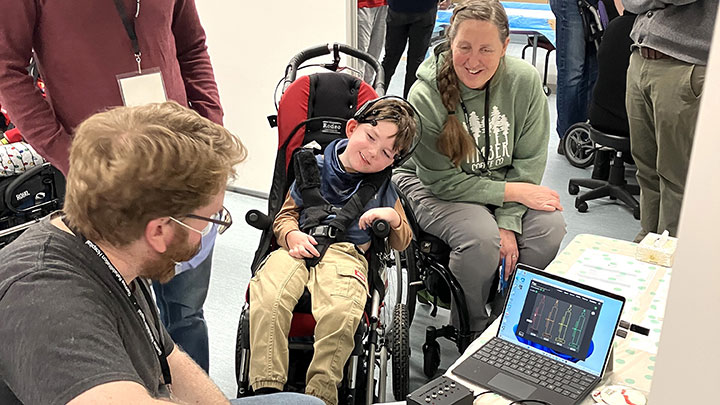
At the Glenrose Rehabilitation Hospital’s Imagination Centre, patients with movement difficulties are using brain-computer interface (BCI) technology to increase independence.
BCI technology allows a person to control devices using brain wave patterns instead of physical movements. BCIs recognize brain wave patterns that are generated by a specific mental action. For example, every time you think about opening your hand, your brain wave patterns will look similar. By thinking about opening your hand many times, we can train a computer to recognize that specific brain wave pattern. Patients can use BCI to control devices such as robots, video games, power wheelchairs, and environmental controls.
View the following service listing to access a service overview, eligibility criteria, hours of operation, contact information and a street map.

Parking at the site is limited; plan to give yourself enough time to arrive at your appointment. There is a cost for parking, refer to the parking map for rates.
From the main entrance of the Glenrose, turn right at patient registration and walk past the piano until you find an elevator on your left
You will meet an occupational therapist and engineer from our team who will introduce you to the equipment in our lab and explain how it works. Patients will be fitted with a cap or headset and will try the technology.
Next, our team will work towards setting a goal that BCI can help achieve (e.g., learning to play video games, operate remote controlled toys, make art, or operate powered mobility devices).
It may take several sessions to learn to use BCI and determine if it is a good fit.
Our team is committed to learning how BCIs can improve an individual’s quality of life, participation, and autonomy. Our research focuses on adapting BCI technology for individuals with neurological disabilities.
Our research program is patient-oriented, meaning the patients that we work with drive our research questions. We are striving for a truly integrated clinical and research program, with researchers, clinicians, patients, and their families working together to advance BCI research and development.
We are proud to be one of the founding members of the BCI-CAN Network, a coalition of three Canadian research facilities committed to driving forward pediatric BCI research and innovation. The network shares technical and clinical expertise, collaborates on multi-centre research initiatives, and collectively trains future pediatric BCI experts through each institution’s graduate programs. The Glenrose BCI program works in partnership with the Alberta Children’s Hospital in Calgary, and the Holland Bloorview Kids Rehabilitation Hospital in Toronto. Together, the programs are highlighting how BCI has tremendous potential to meaningfully impact pediatric patients with significant physical challenges.